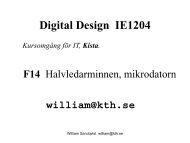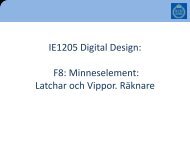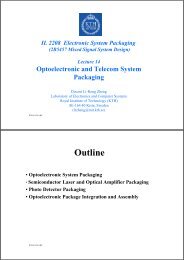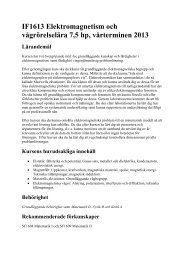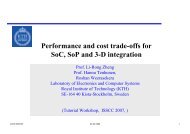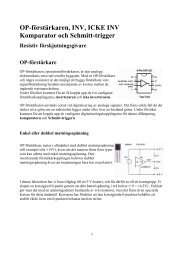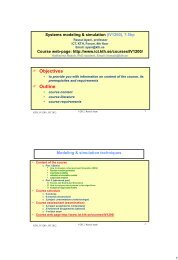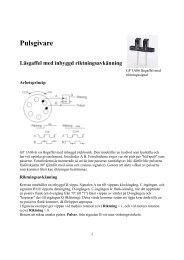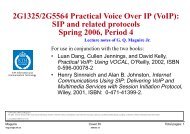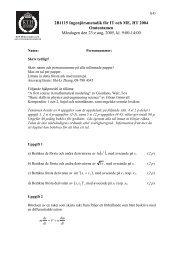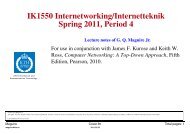- Page 1 and 2:
IK1550 Internetworking/Internettekn
- Page 3 and 4:
Internetworking....................
- Page 5 and 6:
Virtual Interface (VIF)............
- Page 7 and 8:
Module 2: IP Basics: Routing, ARP,
- Page 9 and 10:
Wireshark’s IO Graph functionalit
- Page 11 and 12:
ICMP Redirect .....................
- Page 13 and 14:
Building a UDP packet from scratch
- Page 15 and 16:
Module 5: TCP, HTTP, RPC, NFS, X...
- Page 17 and 18:
Problems with multiple connections.
- Page 19 and 20:
Module 6: SCTP ....................
- Page 21 and 22:
Module 7: Dynamic Routing .........
- Page 23 and 24:
BGP Open Message ..................
- Page 25 and 26:
IGMP Implementation Details........
- Page 27 and 28:
Capacity Assignment ...............
- Page 29 and 30:
Network Management Systems ........
- Page 31 and 32:
Module 10: IPv6 ...................
- Page 33 and 34:
Why IPv6? .........................
- Page 35 and 36:
Wireless WANs . . . . . . . . . . .
- Page 37 and 38:
Module 12: IPSec, VPNs, Firewalls,
- Page 39 and 40:
Module 13: Future and Summary......
- Page 41 and 42:
Peer to peer networking ...........
- Page 43 and 44:
Module 14: Some exercises..........
- Page 45 and 46:
Welcome to the Internetworking cour
- Page 47 and 48:
Goals, Scope and Method Goals of th
- Page 49 and 50:
Learning Outcomes Following this co
- Page 51 and 52:
Prerequisites • Datorkommunikatio
- Page 53 and 54:
Topics • What an internet is and
- Page 55 and 56:
Grades: A..F (ECTS grades) • To g
- Page 57 and 58:
Written Assignment Goal: to gain an
- Page 59 and 60:
Literature The course will mainly b
- Page 61 and 62:
Lecture Plan Subject to revision!
- Page 63 and 64:
Context of the module Communication
- Page 65 and 66:
How can we deal with all of these d
- Page 67 and 68:
Basic concepts open-architecture ne
- Page 69 and 70:
Internetworked Architecture H … M
- Page 71 and 72:
Trends: Shifting from traditional t
- Page 73 and 74:
IP traffic growing exponentially! T
- Page 75 and 76:
Growth rates Some people think the
- Page 77 and 78:
Increasing Data Rates “Ethernet
- Page 79 and 80:
The Internet Today Local … Local
- Page 81 and 82:
Implicit vs. Explicit Information V
- Page 83 and 84:
Encapsulation Appl header user data
- Page 85 and 86:
• Transport layer • Port number
- Page 87 and 88:
IP “Protocol” field (RFC 1700)
- Page 89 and 90:
Decimal Keyword Protocol References
- Page 91 and 92:
Decimal Keyword Protocol References
- Page 93 and 94:
Decimal Keyword Protocol References
- Page 95 and 96:
Basic communication mechanism: data
- Page 97 and 98:
Common Used Simple Services Name TC
- Page 99 and 100:
Simple Campus Network WAN ISP’s r
- Page 101 and 102:
How important are switches vs. rout
- Page 103 and 104:
Ethernet Encapsulation (RFC 894) DS
- Page 105 and 106:
IEEE 802 Numbers of Interest “…
- Page 107 and 108:
SLIP Problems ⇒CSLIP ≡ Compress
- Page 109 and 110:
PPP: Point to Point Protocol PPP (R
- Page 111 and 112:
PPP summary • support for multipl
- Page 113 and 114:
Loopback interface summary • loop
- Page 115 and 116:
Using VIF for tunneling TCP UDP ...
- Page 117 and 118:
Figure 16: Start the program, then
- Page 119 and 120:
Figure 18: After capturing some pac
- Page 121 and 122:
Figure 19: Export the captured traf
- Page 123 and 124:
Importing in to a Microsoft Excel 1
- Page 125 and 126:
Figure 22: Final step -- Note that
- Page 127 and 128:
Using a Perl script #!/usr/bin/perl
- Page 129 and 130:
Choosing which columns to display F
- Page 131 and 132:
Figure 26: Save your parameters and
- Page 133 and 134:
Classful addressing Classically the
- Page 135 and 136:
Special Case IP Addresses IP Addres
- Page 137 and 138:
Classless Inter-Domain Routing (CID
- Page 139 and 140:
IP address assignments Internet Ser
- Page 141 and 142:
Problems with the dual functions of
- Page 143 and 144:
Standardization Organizations The m
- Page 145 and 146:
W. Richard Stevens • Born in Luan
- Page 147 and 148:
[12] Van Jacobson, "If a Clean Slat
- Page 149 and 150:
IP Basics Outline • IP Routing: D
- Page 151 and 152:
Routing The internet protocols are
- Page 153 and 154:
Forwarding • Next-Hop method - ro
- Page 155 and 156:
Forwarding module A simplified view
- Page 157 and 158:
Fast forwarding Mikael Degermark, A
- Page 159 and 160:
where ddd is some numeric value. Ro
- Page 161 and 162:
Host routing A host either: • kno
- Page 163 and 164:
Combining layers Many devices now c
- Page 165 and 166:
What to do with a new computer? We
- Page 167 and 168:
ARP ≡ Address Resolution Protocol
- Page 169 and 170:
Address Resolution Cache Since you
- Page 171 and 172:
ARP example 2 B FTPd C resolver (1)
- Page 173 and 174:
Gratuitous ARP Host sends a request
- Page 175 and 176:
ARP - as seen with ethereal Time So
- Page 177 and 178:
RARP: Reverse Address Resolution Pr
- Page 179 and 180:
RARP server Someone has to know the
- Page 181 and 182:
Novel IPX/SPX Addresses Another app
- Page 183 and 184:
tcpdump Under HP-UX 11.0 # ./tcpdum
- Page 185 and 186:
Tools Used: tcpdump Program tcpdump
- Page 187 and 188:
Maguire Wireshark (formerly Etherea
- Page 189 and 190:
Tools Used: sock Program • A simp
- Page 191 and 192:
#include #include #include #incl
- Page 193 and 194:
Wireshark’s IO Graph functionalit
- Page 195 and 196:
Interarrival delay and variance Fig
- Page 197 and 198:
Summary This lecture we have discus
- Page 199 and 200:
[10] Gianluca Insolvibile, “The L
- Page 201 and 202:
• IP • ICMP • Useful Diagnost
- Page 203 and 204:
checksum, and options fields. Magui
- Page 205 and 206:
MTU½≡Maximum Transmission Unit M
- Page 207 and 208:
Fields relevant to Fragmentation
- Page 209 and 210:
Serial line throughput At 9,000 bit
- Page 211 and 212:
7 {ECN Capable Transport (ECT) and
- Page 213 and 214:
Precedence Precedence values are de
- Page 215 and 216:
Precendence and telephony systems S
- Page 217 and 218:
TTL field Time To Live (TTL) (8 bit
- Page 219 and 220:
IPv4 Options • IPv4 options were
- Page 221 and 222:
Categories of IP Options • Single
- Page 223 and 224:
ICMP Port Unreachable Error Example
- Page 225 and 226:
PING: Packet InterNet Groper or son
- Page 227 and 228:
On a HP-UX 11.0 machine: ping -ov w
- Page 229 and 230:
Useful Tool: Traceroute Programs De
- Page 231 and 232:
This lecture we have discussed: •
- Page 233 and 234:
IK1550 Internetworking/Internettekn
- Page 235 and 236:
Transport layer protocols The trans
- Page 237 and 238:
User Datagram Protocol (UDP) • Da
- Page 239 and 240:
UDP Checksum and Pseudo-Header •
- Page 241 and 242:
Port numbers in three groups Range
- Page 243 and 244:
Fragmentation Required If datagram
- Page 245 and 246:
• on a BSDI system: • each of t
- Page 247 and 248:
With an even larger UDP packet I re
- Page 249 and 250:
Datagram truncation What if the app
- Page 251 and 252:
Learning about Socket programming F
- Page 253 and 254:
UDP server design Stevens, Vol, 1,
- Page 255 and 256:
Changed the client Changing the fol
- Page 257 and 258:
if (!(proto = getprotobyname("raw")
- Page 259 and 260:
ICMP Source Quench Error Since UDP
- Page 261 and 262:
No error control Since UDP has no e
- Page 263 and 264:
BOOTP continued When a request is s
- Page 265 and 266:
DHCP: Dynamic Host Configuration Pr
- Page 267 and 268:
• Message - used by a server to p
- Page 269 and 270:
DHCP’s importance • allows reus
- Page 271 and 272:
Example of dhcpd.conf ### Managed b
- Page 273 and 274:
Trivial File Transfer Procotol (TFT
- Page 275 and 276:
Mapping names to IP addresses Host
- Page 277 and 278:
Zones A zone is a subtree of the DN
- Page 279 and 280:
(see Stevens, Vol. 1, figure 14.2,
- Page 281 and 282:
Domain registrars Internet Corporat
- Page 283 and 284:
Resource Records (RR) See Stevens,
- Page 285 and 286:
Network names Conventions: • it.k
- Page 287 and 288:
Example: $ORIGIN it.kth.se. @ 1D IN
- Page 289 and 290:
How to give your host a name? Host
- Page 291 and 292:
Configuring DNS • Configuring the
- Page 293 and 294:
Load leveling [1] For example, f.ro
- Page 295 and 296:
Where is f.root-servers.net ? trace
- Page 297 and 298:
Dynamic Domain Name System (DDNS) R
- Page 299 and 300:
Attacks upon DNS • Denial of serv
- Page 301 and 302:
DNS performance - top 100 From www.
- Page 303 and 304:
Web performance - continued Using P
- Page 305 and 306:
This lecture we have discussed: •
- Page 307 and 308:
IK1550 Internetworking/Internettekn
- Page 309 and 310:
Transport layer protocols • User
- Page 311 and 312:
Applications which use TCP Lots of
- Page 313 and 314:
TCP header continued Reliability is
- Page 315 and 316:
time client SYN, seq=x SYN, seq=y,
- Page 317 and 318:
client active close ACKs from clien
- Page 319 and 320:
Maximum Segment Size • The Maximu
- Page 321 and 322:
Window size Increasing window size
- Page 323 and 324:
Silly Window Syndrome If receiver a
- Page 325 and 326:
Disabling the Nagle Algorithm But s
- Page 327 and 328:
Resulting bulk data flow Every segm
- Page 329 and 330:
Congestion Avoidance So far we have
- Page 331 and 332:
Slow start In 1989, Van Jacobson in
- Page 333 and 334:
Round-Trip Time Measurement Fundame
- Page 335 and 336:
Congestion Avoidance Algorithm Slow
- Page 337 and 338:
Per-Route Metrics Newer TCPs keeps
- Page 339 and 340:
TCP Keepalive Timer No data flows a
- Page 341 and 342:
Long Fat Pipes Networks with large
- Page 343 and 344:
Example of TCP behavior 1 1. Figure
- Page 345 and 346:
Hypertext Transfer Protocol (HTTP)
- Page 347 and 348:
HTTP Requests request-line == reque
- Page 349 and 350:
HTTP Response Codes HTTP 3-digit re
- Page 351 and 352:
Server Redirect Response code 302,
- Page 353 and 354:
Decrease in total time to produce a
- Page 355 and 356:
HTTP Statistics Statistics for indi
- Page 357 and 358:
HTTP Performance Problems HTTP open
- Page 359 and 360:
Web Enabled Devices emWare - thin c
- Page 361 and 362:
Remote Procedure Call (RPC) Two ver
- Page 363 and 364:
External Data Representation (XDR)
- Page 365 and 366:
NFSspy Insert a new pointer in plac
- Page 367 and 368:
nfsspy Initial implementations were
- Page 369 and 370:
Often there are multiple NFS client
- Page 371 and 372:
NFS Mount protocol Server can check
- Page 373 and 374:
NFS over TCP Provided by some vendo
- Page 375 and 376:
X Window System • Client-server a
- Page 377 and 378:
X was optimized for use across LANs
- Page 379 and 380:
Additional tools for watching TCP P
- Page 381 and 382:
Transaction TCP (T/TCP) Piggyback a
- Page 383 and 384:
References [1] Information Sciences
- Page 385 and 386:
Transport layer protocols • User
- Page 387 and 388:
SCTP Applications • Initial goal
- Page 389 and 390:
• Type SCTP Chunk 0 7 8 15 16 23
- Page 391 and 392:
INIT Chunk 0 7 8 15 16 23 24 31 Typ
- Page 393 and 394:
INIT ACK Chunk 0 7 8 15 16 23 24 31
- Page 395 and 396:
COOKIE ECHO Chunk 0 7 8 15 16 23 24
- Page 397 and 398:
Data Chunk 0 7 8 15 16 23 24 31 Typ
- Page 399 and 400:
Selective Acknowledgement (SACK) Ch
- Page 401 and 402:
Association Termination Two forms o
- Page 403 and 404:
0 7 8 15 16 23 24 31 Type = 14 Flag
- Page 405 and 406:
ethereal capture - daytime - INIT F
- Page 407 and 408:
ethereal capture - daytime - COOKIE
- Page 409 and 410:
ethereal capture - daytime - DATA F
- Page 411 and 412:
ethereal capture - daytime - SHUTDO
- Page 413 and 414:
ethereal capture - daytime - SHUTDO
- Page 415 and 416:
HEARTBEAT and HEARTBEAT ACK Chunks
- Page 417 and 418:
Differences from TCP Congestion Con
- Page 419 and 420:
3 When retransmitting to a remote a
- Page 421 and 422:
Forward Cumulative TSN Allows an en
- Page 423 and 424:
SCTP Performance See the upcoming e
- Page 425 and 426:
Summary This lecture we have discus
- Page 427 and 428:
2002 http://www.ietf.org/rfc/rfc330
- Page 429 and 430:
• Dynamic Routing Protocols Outli
- Page 431 and 432:
Routing Principles • Routing Mech
- Page 433 and 434:
Processing Rouing daemon route comm
- Page 435 and 436:
Autonomous systems (ASs) - RFC1930
- Page 437 and 438:
Routing Algorithms • Static vs. D
- Page 439 and 440:
Routing Information Protocol (RIP)
- Page 441 and 442:
When are routes sent? Solicited res
- Page 443 and 444:
Count to Infinity C network 1 netwo
- Page 445 and 446:
Triggered updates and Hold-Downs To
- Page 447 and 448:
Why would anyone use RIP? After all
- Page 449 and 450:
IGRP Metrics • a vector of metric
- Page 451 and 452:
IGRP Default Gateway Rather than us
- Page 453 and 454:
Open Shortest Path First (OSPF) OSP
- Page 455 and 456:
OSPF building blocks 1. Hello proto
- Page 457 and 458:
Hello packet 0 7 8 15 16 23 24 31 V
- Page 459 and 460:
Link State Announcement (LSA) heade
- Page 461 and 462:
Link state update packet 0 7 8 15 1
- Page 463 and 464:
Link state acknowledgement packet 0
- Page 465 and 466:
Exterior Gateway Protocol (EGP) an
- Page 467 and 468:
Local vs. Transit traffic Local tra
- Page 469 and 470:
BGP does not transmit metrics. Howe
- Page 471 and 472:
Redistribution of Route Information
- Page 473 and 474:
• Open • Update • Keepalive
- Page 475 and 476:
BGP Update Message 0 7 8 15 16 23 2
- Page 477 and 478:
BGP Notification Message 0 7 8 15 1
- Page 479 and 480:
Federal Internet eXchange (FIX) A t
- Page 481 and 482:
Global Internet eXchange (GIX) Glob
- Page 483 and 484:
Network Access Points (NAPs) At the
- Page 485 and 486:
Router Arbiter Project Router Arbit
- Page 487 and 488:
Euro6IX The European IPv6 Internet
- Page 489 and 490:
Flows A flow is defined as a “uni
- Page 491 and 492:
A Tag Edge router labels a packet b
- Page 493 and 494:
Creating tags Since tag switching d
- Page 495 and 496:
Summary This lecture we have discus
- Page 497 and 498:
[14] R. Hinden (Editor), “Applica
- Page 499 and 500:
• Multicast • IGMP • RSVP Out
- Page 501 and 502:
Broadcast and Multicast Traditional
- Page 503 and 504:
Broadcasting • Limited Broadcast
- Page 505 and 506:
Alternative centralized model CU-Se
- Page 507 and 508:
IP Multicast scales well • End-no
- Page 509 and 510:
Steve Deering’s Multicast Dynamic
- Page 511 and 512:
Multicasting IP addresses Multicast
- Page 513 and 514:
Converting Multicast Group to Ether
- Page 515 and 516:
Problems Unfortunately many links d
- Page 517 and 518:
How does IGMP fit into the protocol
- Page 519 and 520:
IGMP Implementation Details In orde
- Page 521 and 522:
IGMP Version 2 [3] Allows a host to
- Page 523 and 524:
IGMP - ethereal Figure 7: IGMP pack
- Page 525 and 526:
Frame 2: IGMP v2 Membership Report
- Page 527 and 528:
Frame 15: IGMP v2 Leave Group Ether
- Page 529 and 530:
Therefore a Multicast Router • Li
- Page 531 and 532:
Multicast Routing - Flooding • ma
- Page 533 and 534:
Multicast Routing - Spanning Trees
- Page 535 and 536:
Reverse -Path Forwarding (RPF) RPF
- Page 537 and 538:
Reverse Path Broadcast (RPB) • We
- Page 539 and 540:
Distance-Vector Multicast Routing P
- Page 541 and 542:
Core-Based Trees (CBT) A fixed poin
- Page 543 and 544:
Multiprotocol BGP (MBGP) [10] Exten
- Page 545 and 546:
Telesys class was multicast over MB
- Page 547 and 548:
MBONE Chronology Nov. 1988 Small gr
- Page 549 and 550:
For the some statistics see: http:/
- Page 551 and 552: mrouted mrouted UNIX deamon tunneli
- Page 553 and 554: GLOP addressing Traditionally multi
- Page 555 and 556: Other multicast efforts PGM: Pragma
- Page 557 and 558: SNMP-based tools and multicast rela
- Page 559 and 560: SNMP tools for working with multica
- Page 561 and 562: RSVP: Resource Reservation Setup Pr
- Page 563 and 564: Resource Reservation • Interarriv
- Page 565 and 566: Capacity Assignment • end-nodes a
- Page 567 and 568: RSVP Soft State • “soft state
- Page 569 and 570: RSVP operations (continued) • At
- Page 571 and 572: Argument against Reservation Given,
- Page 573 and 574: This lecture we have discussed: •
- Page 575 and 576: [13] B. Fenner and D. Meyer (Editor
- Page 577 and 578: • Network Management • SNMP •
- Page 579 and 580: Network Management Process Network
- Page 581 and 582: Version 1 SNMP Version 2 - in 1992-
- Page 583 and 584: SNMP • SNMPv1 • only 5 commands
- Page 585 and 586: Case Diagram To understand the rela
- Page 587 and 588: Remote MONitoring (RMON) [ RMON MIB
- Page 589 and 590: RMON1 Statistics Information collec
- Page 591 and 592: EtherStatsEntry ::= SEQUENCE { ethe
- Page 593 and 594: HostEntry ::= SEQUENCE { HostEntry
- Page 595 and 596: The Matrix Group Matrix group consi
- Page 597 and 598: Information collected from network
- Page 599 and 600: Network Management Systems • HP O
- Page 601: • Web based Interfaced Management
- Page 605 and 606: Common Information Model (CIM) •
- Page 607 and 608: Inter-domain Management task force
- Page 609 and 610: Applications • E-mail • E-mail
- Page 611 and 612: Deregulation ⇒ New regulations
- Page 613 and 614: Latency 1 Usability FAX relay/broad
- Page 615 and 616: Voice Gateway 2B+D or 30B+D or …
- Page 617 and 618: Fax Support Both store-and-forward
- Page 619 and 620: Cisco Voice Over IP Enables Cisco 3
- Page 621 and 622: 2,400/4,800/7,200/9,600/14,400 bps
- Page 623 and 624: “The wireless workplace will soon
- Page 625 and 626: Carriers offering VOIP “Equant, a
- Page 627 and 628: Economics "Can Carriers Make Money
- Page 629 and 630: Patents Mixing voice and data in th
- Page 631 and 632: Deregulation ⇒ Trends • replaci
- Page 633 and 634: RTP: Real-Time Transport Protocol D
- Page 635 and 636: SIP: Session Initiation Protocol SI
- Page 637 and 638: SIP Invite 1 INVITE sip:bob@biloxi.
- Page 639 and 640: SIP Methods Method Invite Bye Optio
- Page 641 and 642: ENUM IETF’s E.164 Number Mapping
- Page 643 and 644: Web Services Using protocols built
- Page 645 and 646: This lecture we have discussed: •
- Page 647 and 648: IK1550 Internetworking/Internettekn
- Page 649 and 650: Internet Protocol Version 6 (IPv6)
- Page 651 and 652: • Wireless computers • supporti
- Page 653 and 654:
Device Control • Control everyday
- Page 655 and 656:
IPv6 header format version 4 bits C
- Page 657 and 658:
Simplifications IPv6 builds on 20 y
- Page 659 and 660:
Payload length Payload length is th
- Page 661 and 662:
Extension headers • Each header i
- Page 663 and 664:
Writing an IPv6 address The 128 bit
- Page 665 and 666:
Binary prefix Hex. prefix Fraction
- Page 667 and 668:
Interface ID Must be unique to the
- Page 669 and 670:
Link local addresses Link local add
- Page 671 and 672:
Permanently assigned groups For exa
- Page 673 and 674:
Prefix for IPv6 documentation The I
- Page 675 and 676:
IPv6 Routing • all standard routi
- Page 677 and 678:
Fragment header Next Header (8 bits
- Page 679 and 680:
intermediate relays on the way to t
- Page 681 and 682:
Security • Header Authentication
- Page 683 and 684:
IPv6 ICMP [13] Type (8 bits) Code (
- Page 685 and 686:
IPv6 ICMP Echo Request/Reply (PING)
- Page 687 and 688:
Summary of IPv6 ICMP • incorporat
- Page 689 and 690:
IPv6 Transition Mechanisms • Incr
- Page 691 and 692:
IPv6 networks 6Bone - http://www.6b
- Page 693 and 694:
If things are to be connected they
- Page 695 and 696:
Where are ISPs? “… There is evi
- Page 697 and 698:
This lecture we have discussed: •
- Page 699 and 700:
[13] A. Conta and S. Deering, “In
- Page 701 and 702:
IK1550 Internetworking/Internettekn
- Page 703 and 704:
Emerging Network Architecture H …
- Page 705 and 706:
Updating after a move Host name:
- Page 707 and 708:
Communication from Z to X γ Z C X
- Page 709 and 710:
Identification γ Z C Y B α γ Z C
- Page 711 and 712:
How did it know to send the “I am
- Page 713 and 714:
Getting Service Once it’s identit
- Page 715 and 716:
Alternative 1 Initially X is locate
- Page 717 and 718:
Alternative 3 Initially X is locate
- Page 719 and 720:
Alternative 4 continued Initially X
- Page 721 and 722:
What happens in the case of wireles
- Page 723 and 724:
Wireless WANs BS-a cell a BS-a cell
- Page 725 and 726:
Mobile IP Standardization Effort
- Page 727 and 728:
A Mobile-IP(V6) Scenario Home Agent
- Page 729 and 730:
Tunneling IP Datagrams Both home ag
- Page 731 and 732:
Why Agent Discovery? Agent Discover
- Page 733 and 734:
Registration Message Format 0 8 16
- Page 735 and 736:
FA Requirements (v4) • Each FA mu
- Page 737 and 738:
Optimization Problem Home site Inte
- Page 739 and 740:
Mobile IP Problems and Development
- Page 741 and 742:
Wireless IP Network Architecture Ho
- Page 743 and 744:
HAWAII extension is similar to Cell
- Page 745 and 746:
Hierarchical FA and Regional Tunnel
- Page 747 and 748:
Hierarchical FA and Regional Tunnel
- Page 749 and 750:
This lecture we have discussed: •
- Page 751 and 752:
IK1550 Internetworking/Internettekn
- Page 753 and 754:
Private networks Private Networks a
- Page 755 and 756:
Security Protocols, APIs, etc. •
- Page 757 and 758:
IPSec IPSec in three parts: • enc
- Page 759 and 760:
AH header For authentication purpos
- Page 761 and 762:
Where can you run IPSec? Mode Where
- Page 763 and 764:
Linux firewall For example, for the
- Page 765 and 766:
Proxy Access Through A Firewall ext
- Page 767 and 768:
Newping http://ftp.cerias.purdue.ed
- Page 769 and 770:
Secure Mailer (aka Postfix) Wietse
- Page 771 and 772:
• TCP Wrappers - allows monitorin
- Page 773 and 774:
Network Address Translation exterio
- Page 775 and 776:
Network Security Exercises You will
- Page 777 and 778:
This lecture we have discussed: •
- Page 779 and 780:
[13] Swedish Defense Material Admin
- Page 781 and 782:
IK1550 Internetworking/Internettekn
- Page 783 and 784:
Generations of technology versus ge
- Page 785 and 786:
Dissemination not conversation On s
- Page 787 and 788:
Are interplanetary and intergalacti
- Page 789 and 790:
Trends: Shifting from traditional t
- Page 791 and 792:
Visualizing these laws 100 25000 80
- Page 793 and 794:
Exponential growth As Ray Kurzweil
- Page 795 and 796:
Is this only true for books? Chris
- Page 797 and 798:
Too cheap to meter "It is not too m
- Page 799 and 800:
What Would Google Do? Jeff Jarvis
- Page 801 and 802:
Service Differentiation Integrated
- Page 803 and 804:
Mobile ad hoc Networks (MANETs) Ad
- Page 805 and 806:
PC interfaces Standard I/O ports of
- Page 807 and 808:
IP Storage Area Networks (SANs) Usi
- Page 809 and 810:
• Internet SCSI (iSCSI) JBOD == J
- Page 811 and 812:
“Beowulf-class” machines Using
- Page 813 and 814:
Internet2 http://www.internet2.org/
- Page 815 and 816:
Speed through Silicon FPGAs used in
- Page 817 and 818:
Active Networks • Network nodes c
- Page 819 and 820:
Smart Networks with Sensors (Ren an
- Page 821 and 822:
Future of the Internet An important
- Page 823 and 824:
Clean slate re-design of the Intern
- Page 825 and 826:
Is an hourglass the right model? Ru
- Page 827 and 828:
Wikinomics Don Tapscott and Anthony
- Page 829 and 830:
Resource pooling examples Resource
- Page 831 and 832:
What kinds of things might be inter
- Page 833 and 834:
Vehicle Area Networks (VANs) Contro
- Page 835 and 836:
• Vehicle maintenance: diagnostic
- Page 837 and 838:
Buildings Heating, Ventilation, and
- Page 839 and 840:
Infrastructure • Is their ice on
- Page 841 and 842:
Is saying “Internet of xxx” mis
- Page 843 and 844:
• Server and Network Bandwidth an
- Page 845 and 846:
Evolution of new varieties of netwo
- Page 847 and 848:
How do I know where I am? Location
- Page 849 and 850:
Requirements • Systems with which
- Page 851 and 852:
Badge Communications Model Badges a
- Page 853 and 854:
Smart Badge Sensors Details of the
- Page 855 and 856:
A view of the packaged badge As sho
- Page 857 and 858:
Split the functions between access
- Page 859 and 860:
Personal Computing and Communicatio
- Page 861 and 862:
Future Systems Audio I/O GPS source
- Page 863 and 864:
Non-metalic bi-directional neural i
- Page 865 and 866:
Spotting trends at 1% Mark J. Penn
- Page 867 and 868:
Further Reading [1] Kalevi Kilkki,
- Page 869 and 870:
[23] Darwin Valderas Núñez, “In
- Page 871 and 872:
Thanks Best wishes on your written
- Page 873 and 874:
Internets - configuration 1 Figure
- Page 875 and 876:
Adding a firewall and router Intern
- Page 877 and 878:
Adding a WiMAX link Internets - con
- Page 879:
Adding two-way multimedia Configura



